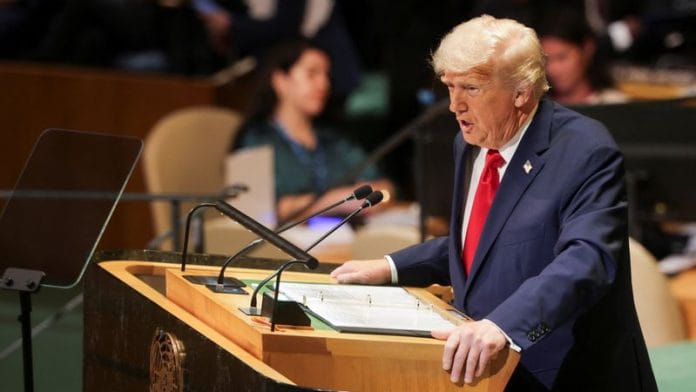US President Donald Trump held a meeting with leaders of Qatar, Jordan, Turkey, Pakistan, Indonesia, Egypt, the United Arab Emirates, and Saudi Arabia on the sidelines of the United Nations General Assembly in New York, where he rolled out a 21-point roadmap for peace in Gaza, a perennial flashpoint in the Middle East.
The plan reportedly includes the return of hostages seized by Hamas — a US-designated foreign terrorist organisation — in its dastardly 7 October 2023 attack on Israel; the establishment of a permanent ceasefire; the governance of Gaza without Hamas; and a gradual withdrawal of Israeli forces.
US Special Envoy for Peace Missions, Steve Witkoff, described the discussions as a “very productive session” between Trump, US officials, and regional leaders at the Concordia Summit in New York. He said he was “hopeful, and I might say even confident” that a breakthrough could come within days. However, Arab and Islamic leaders were keeping their fingers crossed over what is now being described as Trump’s “21-point plan for peace in Gaza.”
Also read: Trump is cosying up to rogue nations, dumping friends. He’s set a perilous course for US
Ground realities
The realities on the ground appear stacked against Trump’s blueprint, which he is trying to sell to the Arab and Islamic leaders, some of whom matter very little in the conflict. Israel’s recent strike in Doha to eliminate Hamas leadership has hardened positions on both sides. Hamas is in no mood to return the remaining hostages, as it would not like to give up the leverage it has in negotiations. The health and mental condition of those hostages are anyone’s guess. Israel, for its part, will not settle for anything short of their return, an issue likely to soon acquire heavy socio-political weight domestically.
This stalemate makes an early ceasefire improbable. Neither side sees tangible gains from halting hostilities. In these circumstances, military action in Gaza is likely to continue, if not intensify, prolonging the suffering of civilians.
Meanwhile, political leadership in Tel Aviv appears determined to pursue its long-standing ambition of tightening control over the West Bank, if not totally annex it, which is a likely possibility in the future if not stopped now. While the US is the only force that can possibly deter Israel from its West Bank plan, Trump himself is not very sure if he should put his foot down on Netanyahu’s war plans.
The West Bank-Gaza takeover plans are not new. Successive Israeli leaders have fought and won elections on this promise, which directly affects the legitimate rights of Palestinians who have reportedly been reduced to a minority in several settlements over the past five or six decades. Israel has built about 160 settlements, housing 700,000 Jews since it occupied the West Bank and East Jerusalem in June 1967.
The settler expansion has risen sharply since Prime Minister Benjamin Netanyahu returned to power in late 2022 as the head of a right-wing, pro-settler coalition, as well as the start of the Gaza war, triggered by Hamas’ 7 October 2023 attack.
The E1 settlement plan
The government has now officially revived the controversial E1 project, yet another settlement plan. The E1 corridor spans about 12 square kilometres east of East Jerusalem and west of Ma’ale Adumim in the West Bank. It envisions 3,412 housing units capable of accommodating 12,000 to 15,000 residents. The land falls inside the jurisdictional boundaries of Ma’ale Adumim, and any construction there would become part of the existing settlement city.
Israel’s Finance Minister Bezalel Smotrich hailed the civil administration’s approval of the E1 project as “historic,” declaring that it “practically erases the two-state delusion and consolidates the Jewish people’s hold on the heart of the Land of Israel.”
East Jerusalem was effectively annexed by Israel in 1980, a move unrecognised by most of the international community but never annulled by any global body, including the UN. Once completed, the E1 project would effectively split the West Bank, cutting off its north from the south and blocking the development of a contiguous Palestinian state linking Ramallah, East Jerusalem, and Bethlehem.
Abraham Accords and Trump’s dilemma
The 2020 Abraham Accords came after Israel threatened to annex the West Bank. The US convinced the United Arab Emirates to normalise ties with Israel in exchange for an Israeli promise not to go ahead with its plans in the West Bank. Trump 2.0 hopes to build on the Abraham Accords by brokering another ceasefire and peace arrangement in the Middle East.
But frustrations among Arab leaders are growing. They notice how Trump has been unable to carry the Abraham Accords to their logical conclusion, restrain Israel from following its path of achieving the goal of “Greater Israel” by weakening Palestinian Authority, and discipline Hamas through strong counter-terrorism measures. These gaps probably compelled Trump to come with his new 21-point plan.
Given the current instability and ambiguity in the world order, the prospects for these plans to succeed look dim. The entrenched positions of Israel and Hamas, the expansion of settlements, and the disillusionment of Arab leaders make it unlikely that the Trump initiative will succeed where past efforts have failed.
Seshadri Chari is the former editor of ‘Organiser’. He tweets @seshadrichari. Views are personal.
(Edited by Prashant)






